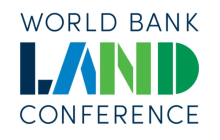Inclusive and Transparent Land Governance Practices for Land Administration Institutions
The session focused on the critical role of inclusive and transparent land governance in fostering climate resilience, particularly in the context of Africa’s ongoing struggles with the impacts of climate change. Recognizing land as a foundational element for economic, environmental, and social stability, the discussion centered on the need for people-centered land governance and secure tenure to support community adaptation to climate challenges. Presentations highlighted successes in streamlining land administration processes and showcased the positive impacts of efficient land management on climate adaptation and resilience. Emphasis was placed on the importance of the rule of law in achieving justice and sustainable development, with land governance serving as a catalyst for accountable and equitable climate action. The session also acknowledged the limitations of current efforts, suggesting targeted political, financial, and policy investments to strengthen the link between land governance and climate mitigation. Innovations in adaptive land use and geospatial data technologies were featured, including their potential for early warning systems and post-disaster recovery. Additionally, the Rangelands Initiative was highlighted as a promising model for sustainable land management. The session underscored the importance of a multi-stakeholder approach, advocating for collective action and partnerships to drive meaningful change, and concluded with a call for greater awareness and engagement in advancing land governance as a pathway to addressing climate change.
This resource has been made available by the organizers of the World Bank Land Conference under the following disclaimer.
This resource has been made available by the organizers of the World Bank Land Conference under the following disclaimer.
Publisher(s)
Geographical focus


